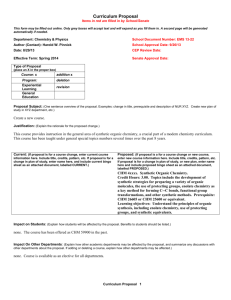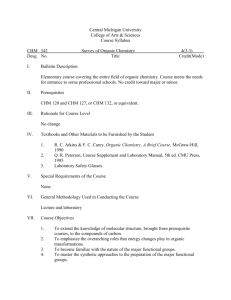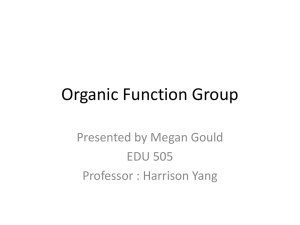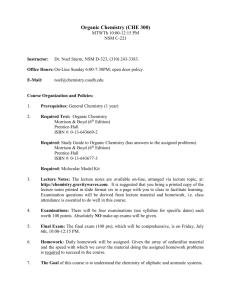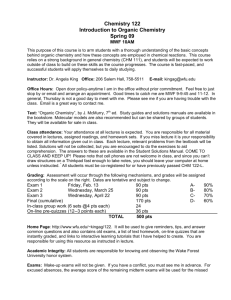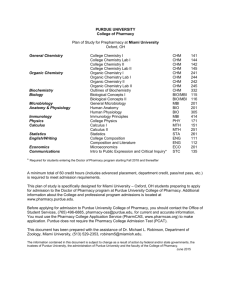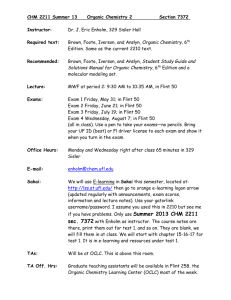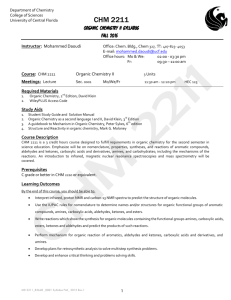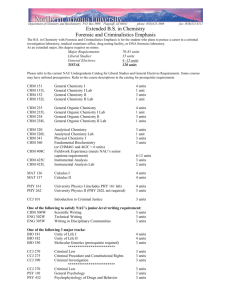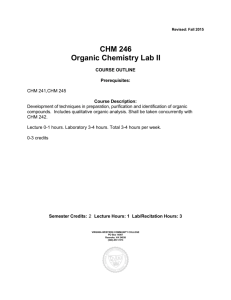Fall-2015-CHM-5225-Advanced-Organic
advertisement
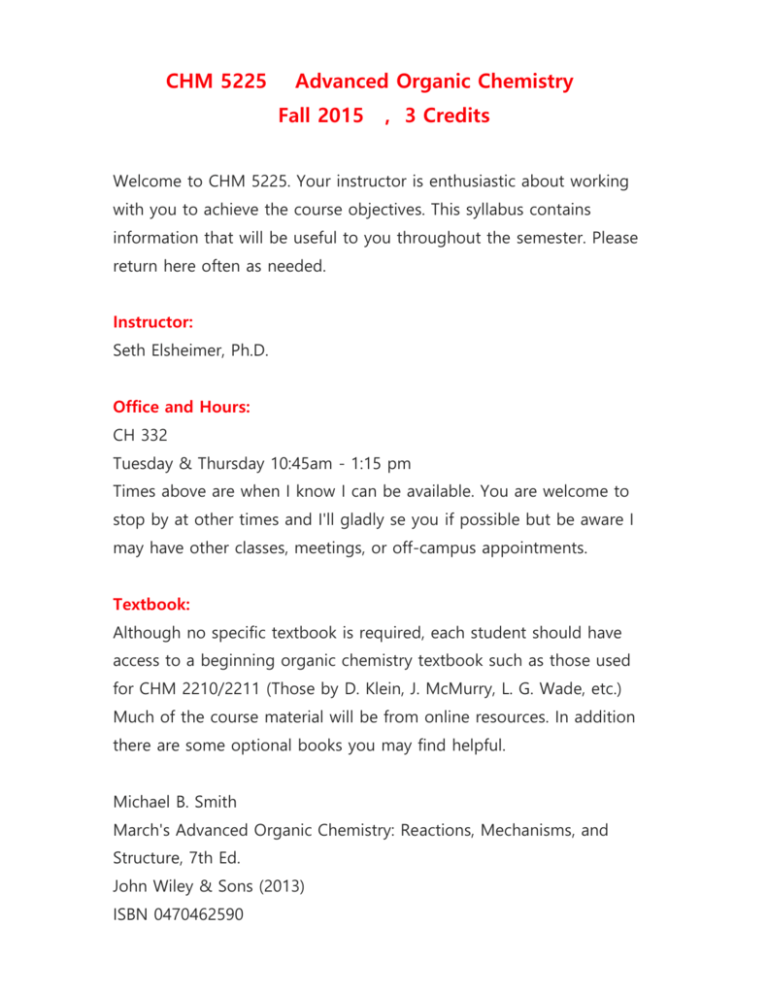
CHM 5225 Advanced Organic Chemistry Fall 2015 , 3 Credits Welcome to CHM 5225. Your instructor is enthusiastic about working with you to achieve the course objectives. This syllabus contains information that will be useful to you throughout the semester. Please return here often as needed. Instructor: Seth Elsheimer, Ph.D. Office and Hours: CH 332 Tuesday & Thursday 10:45am - 1:15 pm Times above are when I know I can be available. You are welcome to stop by at other times and I'll gladly se you if possible but be aware I may have other classes, meetings, or off-campus appointments. Textbook: Although no specific textbook is required, each student should have access to a beginning organic chemistry textbook such as those used for CHM 2210/2211 (Those by D. Klein, J. McMurry, L. G. Wade, etc.) Much of the course material will be from online resources. In addition there are some optional books you may find helpful. Michael B. Smith March's Advanced Organic Chemistry: Reactions, Mechanisms, and Structure, 7th Ed. John Wiley & Sons (2013) ISBN 0470462590 Francis A. Carey and Richard J. Sundberg Advanced Organic Chemistry Part A: Structure and Mechanisms, 5th Ed Springer (2007) ISBN: 978-0-387-68346-1 Earlier editions of both the above classic texts are widely available and suitable for most purposes. The lectures only loosely correlate with the above books. The Smith & March book is comprehensive but brief in its treatment of most topics and is an excellent reference book. It contains a large number of literature citations that will direct you to primary sources, review articles, and specialized monographs as needed. The Carey and Sundberg book is easier to read and contains more detailed explanations. The numerous practice exercises include literature citations for the solutions. Course Goals: 1. Be able to explain structure-property relationships, i.e., deduce chemical and physical properties based on structure. 2. Understand reaction mechanisms, how they are determined, and conventions for describing them. 3. Gain exposure and experience sufficient to critically evaluate published organic chemistry literature. Course Description: This graduate-level elective includes topics classified as physical organic chemistry that students can help select based on their interests, background and career goals. These include but are not limited to the following. Structure and bonding models and theories Simple molecular orbital theory Advanced nomenclature Stereochemistry Conformational analysis Acidity and base strength Aromaticity and antiaromaticity Mechanistic probes Structure-reactivity relationships Kinetics and thermodynamics Enols, enolates, and regiochemistry Types of mechanisms Reactive intermediates: Cations, anions, radicals, carbenes Pericyclic reactions and orbital symmetry Photochemistry An organic chemistry background comparable to CHM 2210 and CHM 2211 is assumed. A brief review of relevant topics will be presented or cited but the ultimate responsibility for review and supplemental study rests with the student. Course Requirements: 1. CHM 2211, Organic Chemistry II, is a prerequisite. You must have already earned passing grades for the equivalent of two semesters of undergraduate organic chemistry and have sufficient mastery of that material to build on it. 2. Take all tests and the final exam at the scheduled times. Exceptions are rare but can sometimes be arranged in advance if a test is to be taken a day early (but not later). 3. Except on test days class attendance is optional but please do not miss class then later expect a private lecture. You are responsible for the reading, lecture material, and any announcements all of which are available from classmates or on line. 4. Stay current with the recommended reading and exercises. Be ready to respond to similar or identical problems on tests. 5. Retrieve and correct each graded test as soon as possible. Grading: 500 = 5 progress tests (5 X 100) 100 = Cumulative Final Exam 600 points The final exam score can replace the lowest progress test score if the final exam score is higher. If a test is missed for any reason, the final exam score will be used in its place. No make-up tests are offered so please do not ask. If you miss a test it will be assumed you had a good reason. That is precisely the purpose of the final exam replacement policy. No documentation is needed or wanted. Letter grades will be curved according to class performance as needed. Rankings and approximate letter grades will be posted outside CH 332 anonymously and/or posted online via Webcourses@UCF. Updates will appear after each test so you can always know your current course grade. Plus and minus grades are used rarely and only in a few close borderline cases. In those situations the final exam score, class participation, and trends during the semester are considered. The withdrawal deadline set by the university is 11:59 pm Monday, 11/2/2015 at 11:59pm. Before that time you can withdraw from the course without grade penalty and a W wallpaper o your transcript. If you attempt to withdraw after the deadline the instructor is required to submit a grade t the registrar to indicate whether or not you were passing at the time of withdrawal. WP indicates passing and has no effect on the GPA while WF indicates failing and counts the same as F in GPA calcualitions. Practice exercises will be assigned often but will not be collected or graded. These are intended to prepare you for the tests which will be similar or identical in scope, format, and difficulty. Complete academic honesty is expected in all aspects of the course. Any unethical conduct will be reported to the Office of Student Conduct and fully prosecuted according to Florida law and university regulations. Please consult the current Undergraduate Catalog and/or the The Golden Rule for definitions and policies. Test dates: (Tentative, any changes will be announced in class.) Test 1 Thur 9/10/15 Test 2 Tues 9/29/15 Test 3 Thur 10/15/15 Test 4 Thur 11/5/15 Test 5 Thur 12/3/15 Final Exam, Set by UCF for Thursday 12/10/15, 1:00-3:50pm (Note earlier start time.) See schedule Etiquette: In consideration of others please silence cell phones in class and refrain from audible conversation.
